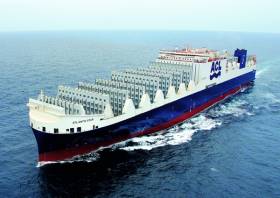Displaying items by tag: ACL sign contract
Largest ConRo Sails As ACL Sign North American-Europe Deal
#GiantCONRO - Atlantic Container Lines (ACL) giant new 81,600 tonnes leadship Atlantic Star, the largest ever container/ro-ro (conro) built ship was noted by Afloat.ie off Anglesey yesterday while bound to Liverpool.
The Atlantic Star will operate alongside her sisters of the next generation G4 vessels on ACL's twice weekly calls at Halifax, Canada which are to be maintained by the operator in a deal running through to 2022.
The contract will see ACL continue to serve the North American and European markets at the Fairview Cove Container Terminal of Ceres Halifax Inc up to 2022. It was at this terminal at the Port of Halifax that welcomed the maiden call in January of the Chinese built giant Altantic Star which is almost 300m long.
Atlantic Star will be joined by four sisterships to form the new G4 ConRo vessels and are the largest of their type to be built incorporating innovative design features.
Compared to the G3 predecessors (see, Atlantic Companion stories from last year) the newbuilds container capacity is more than doubled at 3800 TEUs, plus 28,900 square meters of RORO space and a car capacity of 1300+ vehicles.
Andrew Abbott, President & CEO of ACL, "We value our long-term working relationships with the Halifax Port Authority and Ceres. We looked long and hard at various schedule alternatives for our new ships. Some excluded Halifax. But we just could not ignore the close cooperation and support of the HPA and Ceres that removed every obstacle to a long-term agreement. The quality improvements to the CN Rail service and the consistent cooperation of our ILA colleagues were also influential factors in our decision”
Abbot added “As a result of this, all the stakeholders of the port will benefit, as ACL volume via Halifax will eventually double as all of our new ships enter service. ACL looks forward to a long future in Halifax with our large, new, fuel efficient and environmentally friendly G4 vessels. The Port of Halifax will now remain our largest port in North America, and our gateway for Canada and the US Midwest."
ACL has been continuously calling the Port of Halifax since 1970 following the inaugural call of the ACL G1 vessel Atlantic Star in 1969 which flew the UK flag. With the recent introduction of Atlantic Star she too will be registered in the United Kingdom.
ACL's current schedule and port rotation will be maintained until all five G4 vessels are in service. During the second quarter of 2016 ACL will announce its new G4 schedule.





























































